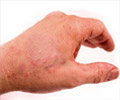The itchy skin condition can affect people at different stages of their lives. Subgrouping them can help in better treatment.

‘The newly identified subgroups of eczema can help in a clearer prognosis and ultimately better treatments.’





"We've also shown that genetic risk factors contribute to the most troublesome and long-lasting eczema, so these patients can be our focus for future research to improve care. It's also important evidence that we need to consider which subtypes of eczema may respond to which treatments in clinical trials to ensure the right children get the right treatment in future." The researchers looked at 13,500 children from birth to 11 or 16 years, born in the UK or Netherlands. Around 40 per cent of children developed eczema at some time in their life. Through statistical analysis, the researchers were able to identify different groups including children whose eczema begins in infancy but then resolves, as different from children whose eczema starts later or becomes a long-term problem.
The groups were defined as:
- Eczema starts in infancy and doesn't go away
- Eczema starts in infancy and lasts throughout childhood
- Eczema starts in infancy and goes away in early childhood
- Eczema starts in mid-childhood (around 6 years) and goes away later in childhood
- Eczema starts in late childhood (11 years-early teens) and then goes away
Dr Lavinia Paternoster, Senior Lecturer in Genetic Epidemiology from Bristol Medical School: Population Health Sciences, who initiated the study, said: "This study brought together two European birth cohorts, PIAMA, from the Netherlands and ALSPAC (or 'Children of the 90s') from Bristol.
Advertisement
"We've found some evidence of what might cause children to suffer from different subtypes of eczema, but we still need to do a lot more work to understand this further and work out how we can use this information in the clinic to better help patients."
Advertisement
"To families of children suffering from eczema, research results like this paper on sub-groups of patients provide much needed hope for a clearer prognosis and ultimately better treatments.
"The impact of atopic dermatitis on people's quality of life can be devastating. With this chronic condition on the increase, the work of Professor Sara Brown and her academic colleagues is crucial and always welcome by our members."
Source-Eurekalert












